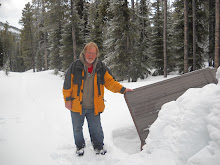Hewing a Shaving Horse
In January 2014, out here in the Lynx Creek area, a lot of trees blew
down so working with an ax, a pruning saw and some other hand held
tools I figured I could do a little woodcraft.
By mid March I had found a sold aspen and hewed it down, mostly with
an ax, because that is pretty well all I had to work with, to where I could innovate a shaving horse.
When the time came and I had to leave Lynx Creek I threw the log over the fence
, not knowing if I would return for it or not, but I did return and early in January 2015 I retrieved my aspen log and used
it again for a month or so. This time my stay at Lynx Creek only lasted until early
February. When I left the second time I tossed the log on the wood pile. During a
visit in late April or Early May I noticed the log was still there so
when I returned in November I came prepared with me a one man crosscut saw and a two man crosscut saw, as well
as a bow saw and another bucksaw. I also brought the usual
woodworking tools, drawknives, spokeshaves, chisels, planes etc. I had a notion I would complete the project. I also have a clearer idea of how I would proceed. My first task was to hew it down a more level bench area and put legs on it. A
birch sapling cut into appropriate lengths made suitable legs.
Next I would need a good sold piece of wood to make the bottom part
of the clamp. I sawed a solid piece of log out
of one of the spruce trees which had been blown down almost 2 years ago.
First this log would need to be hewn square.
Then I would saw and hew it down to a wedge shape.
Next I mortised a square hole using a wood chisel.
Next I mortised a matching hole in the bench part as well.
For the upper jaw of the clamp I first tried to get a good piece of aspen and after a lot of sawing by hand I was only to discover the aspen log was rotten in the middle. Then I went in search of a piece of pine. There are lots of dead pine but after chopping and sawing I realized that
finding good solid pieces was not so easy.
I only discovered this piece of pine was not suitable after sawing it out of a larger tree and carrying it quite away. It had a lot of wood rot and I had to discard it.
I decided this tree trunk might be solid enough for what I needed to
do.
It took a considerable amount of chopping to free the roots. Once the
stump was free I then set to hewing it down enough to allow me to carry it to my
work area.
It took a lot more sawing and hewing to bring the piece down to size with a the tenon on
it.
Next came the task of fitting and adjusting all the pieces so that the upper jaw would align with the lower jaw. Once it looked like everything would fit it was all tied together using some readirod. A 3/4” bolt
is the pivot for the upper jaw of the clamp.
Last of all a hole is bored in the bottom of the tenon and a foot brace was whittled and inserted.
Now I can begin to shave down this piece of birch.
Building a shaving horse with limited tools in this way takes a lot of physical effort, but then a project like this is not as much about the destination as it is about the journey.















